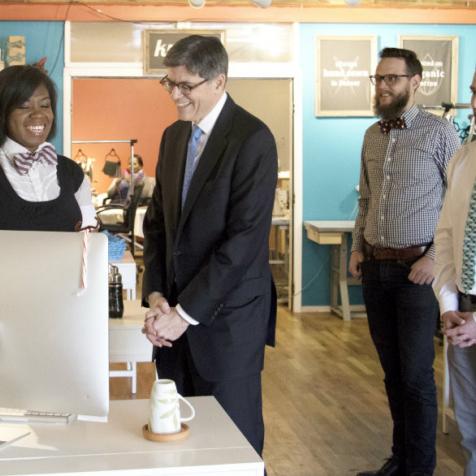
Company Details
On Jan. 2, United States Secretary of the Treasury Jack Lew visited Denver's Knotty Tie on Jan. 5 and got an up-close look at the company's custom tie manufacturing operation. He also met a number of employees, many of whom are resettled refugees.
That's part of Knotty Tie's social mission, says co-founder Jeremy Priest, noting that about half of the company's 16 employees are resettled refugees. The company's focus on employee growth, custom patterns, and customer service paid off the tune of about 300 percent growth in 2015, as sales approached $1 million.
Knotty Tie was financed with more than $100,000 in loans from the Colorado Enterprise Fund, which was in turn staked by Treasury's State Small Business Credit Initiative (SSBCI), a program that has staked about 12,000 small businesses with more than $1.2 billion to date.

After Lew's tour of the company's facility in Denver's Art District on Santa Fe, he took time out to discuss the state of small business and manufacturing issues in Colorado and beyond with CompanyWeek Editor Eric Peterson.
CompanyWeek: What are your impressions of Knotty Tie?
U.S. Treasury Secretary Jack Lew: It's a great idea. It just shows you that entrepreneurship is alive and well, and creative ideas can be combined with really impressive social purpose. The combination of a startup that is creating work opportunities for new immigrants who are starting out in this country is really very impressive.
CW: How important is it to support small manufacturers like Knotty Tie with public funding?
Lew: Very important. The Colorado initiative is funded by a Treasury program that helps each of the states develop this kind of funding for innovation and an incubator program.
You can't get started without access to capital. The system is not easy for new ideas to get funded through the traditional financial infrastructure. Getting that first capital, that first start, or making a pivot at a tough moment, these programs are critical. This seems to me to be the kind of enterprise that will graduate from that kind of funding.
They've shown they can use the money well. It makes me very proud of the program we run. When you come and see how an idea becomes a reality with really small amounts of help, a $10,000 loan out of the box.

CW: What's your outlook for manufacturing in the U.S.?
Lew: Manufacturing has a bright future in the United States. We have so many advantages in the United States in terms of the stability of our system and the ability to plan a business. Three guys can go out and make it happen. In other countries, it takes years to get the approvals you need to get through the gate to get started. Here we have infrastructure, we have access to skilled workers and technology, so we have a lot of things that are advantageous. And I think it's not just craft manufacturing. Our auto industry is doing very well right now.
One of the things a business like this shows is it still makes a difference to be local. The difference between delivering a product in a week or several months, that's a difference that makes a difference, and access to capital, access to labor is critically important. That's where there is a public role.
CW: What are some of the workforce issues related to manufacturing coming back to the U.S. recently?
Lew: If you have a good relationship with your workforce where you look to them as long-term employees, it's worth investing in them, and that's what I heard here today.
There's a lot of businesses where if we could do a little bit better with our high schools, community colleges and four-year colleges to match up training with skills that are needed, there's a lot of people who could fill the jobs of the future.
It's not going to be one size fits all in the technology area. There are basic skills that you need to get through our educational system. That's a public responsibility. There are specific skills employers are going to need to provide. For instance, they're not going to want everyone to know all of their unique processes and practices, but they shouldn't have to start from scratch. Partnering between the private and the public sector is critical because if our education system and our community college system were really in sync with the local business needs, we wouldn't have 4 million empty jobs in this country.

